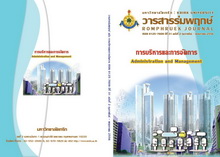ความสัมพันธ์ระหว่างความเจริญเติบโตทางเศรษฐกิจ กับภาวะโลกร้อนในประเทศไทยตามสมมติฐาน เส้นโค้งสิ่งแวดล้อมของ Kuznets
Main Article Content
Abstract
The Relationship between Economic Growth and Global Warming in Thailand based on the Environmental Kuznets Curve Hypothesis
Economic growth is a worthwhile economic goal, but economic well-being also results in the destruction of natural resources. As consumption of goods and services rise, natural resources are being depleted. The environmental landscape also changes. Of particular concern is the global warming issue. Consequently, there is an acute need to study the impact on environment as a result of economic development. For the study of the influence of economic development on the environment, the most popular concept is “Environmental Kuznets Curve Hypothesis”. In this study, the carbon dioxide (CO2) emission is used both as a proxy of global warming and as a dependent variable interacting with other independent variables. In summary, GDP per capita relationship with natural variables corresponds to the Environmental Kuznets Curve Hypothesis. Among other findings concerning global warming: The fossil fuel energy consumption is positively related to global warming, while Thailand’s total forest area is negatively correlated with agricultural area.
Article Details
Every article published in the Romphruek Journal of the Humanities and Social Sciences is the opinion and point of view of the authors. Thery're not the viewpoint of Krirk University or the editored department. Any part or all of the articles for pablication must be clearly cited.


